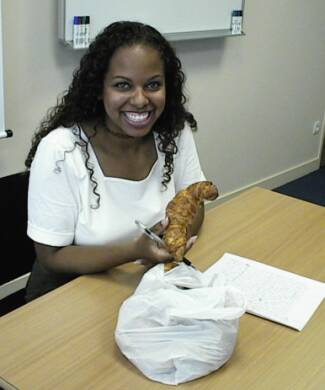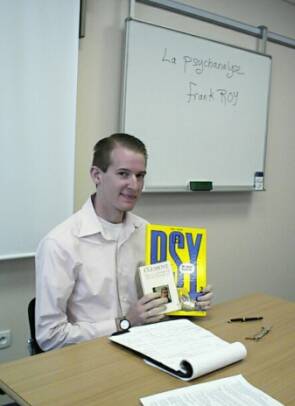WVU-V!
Counting down...
July 3, 2000
(Katie McMullen prepares a slice of strawberry birthday pie for Jodi
Mckenzie,
June 21, 2000)
| Today is our next to last day for WVU-V 2000.
Certainly not the least, however. Our individual culture projects
have been a major part of the program, and we have three oral reports days
on our findings.
Manieka Green was interested in the fact that France seems to have a
very great number of small shops and boutiques in relation to the US, and
this in spite of the large number of "grandes surfaces" such as
Géant and Intermarché which are roughly equivalent to our Wal-Mart and
K-Mart. To find out more Manieka interviewed the owner of a small
"patisserie" (pastry shop) here in Les Sables. The
interview was fascinating in several ways, but especially in the
proprietor's contention that the giant superstores were no threat at
all. This shop has been in business since 1994 and has seen
absolutely no decline in business as the superstores built up all around
the city. The owners here consider that the the quality of their
product services is the secret to their success. After talking to
clients in both small boutiques and in the superstores, Manieka is also
convinced that the demand in France for personalized service and products
of high quality is the reason for the remarkable number of small private
businesses.
|

|
|

|
Amanda Alderman was interested in the ways of the road in
France. While the French drive on the right side of the road just
like Americans, many other aspects of their relation to the car are
different. In France you may get your learners licence at the age of
16, but you must be at least 18 before driving a car alone. That age
is 14 for scooters and 21 for motorcycles. For the first year, you
must attach a large sticker to your car that indicates you are beginner
and that you have a special set of speed limits. Since obligatory
lessons and exams are very difficult and very expensive, many young French
drivers wait some time before getting their first driver's license.
The testing process costs around 5000 francs and is more expensive the
second or third time around. Automobile insurance is also relatively
expensive here, and works with a system of bonus and "malus"
points to determine rates and discounts. A driver's license comes
with five points and points are deducted for driving errors such a
speeding or running a stop sign. Driving under the influence of
alcohol can result in the loss of 3 points, which can mean a speedy and
lengthy loss of the license for repeat offenders. |
| Ryan Schiffbauer is very interested in psychology.
He was interested in the fact that Freudian psychoanalysis is much more
prevalent in France than in the States. He therefore obtained an
interview with Dr. Frank Roy, a psychoanalysts who divides his time
between his practice in Les Sables the courses he teaches at the
University of Paris. Dr. Roy is convinced the the American
philosophy of pragmatism is and essential reason for the predominance of
behaviorism in that country. He believes that to get to depths of
psychic conflicts a complete Freudian analysis is necessary. Such a
process takes at least two years and may last a lifetime, and it may
consider the surface problems of the patient as mere symptoms of conflicts
that find their origins very early in one's psychic development. Dr.
Roy does not practice behavioral manipulation and he does not use
chemicals to alter the patient's symptoms. Such techniques for a
pure psychoanalyst would only mask the inner problems he seeks to bring to
the surface. As for Ryan, he is convinced the cognitive psychology
is a holistic approach human psychic conflicts. |

|
Tomorrow is our last day of class, and we
look forward to hearing he results of several other interesting culture
projects, so be sure to ...
Stay tuned to WVU-V!
Back to the Calendar
Comments to: mlasting@wvu.edu